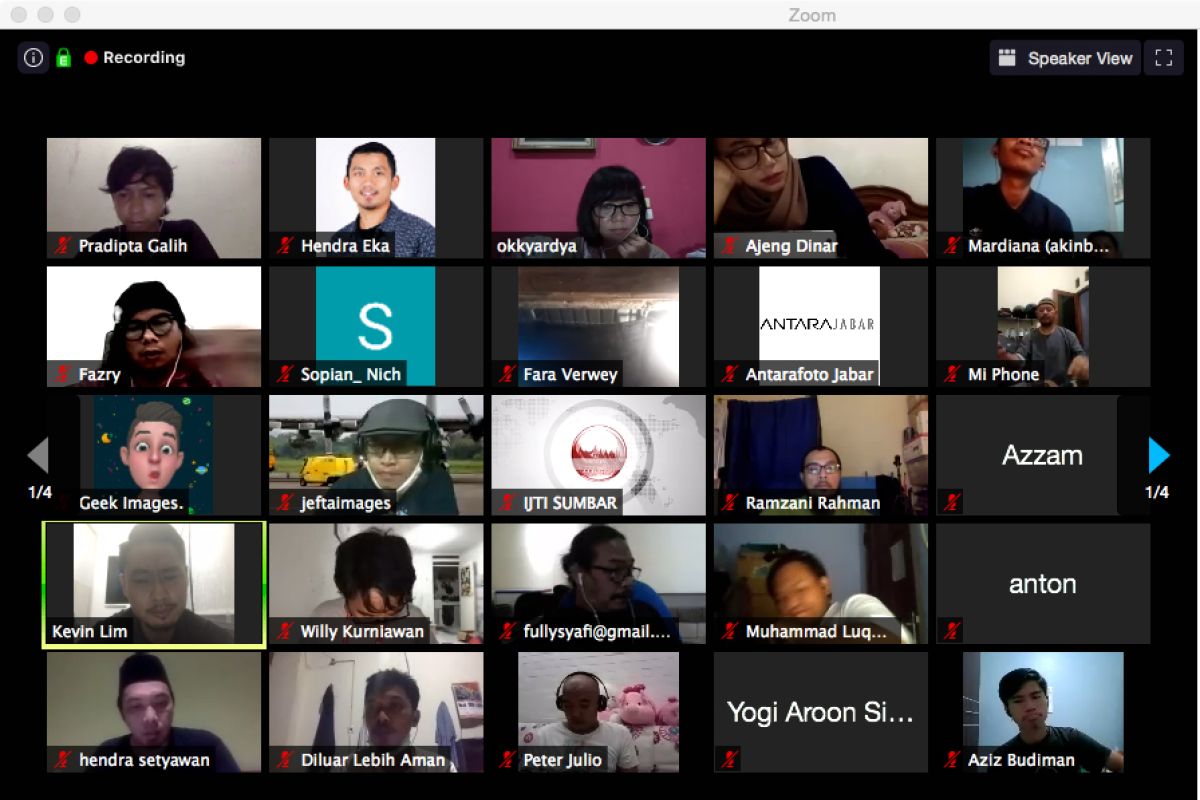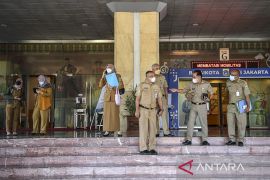Now, most of the people are feeling productive by doing their jobs at home, and believe that workers (would) tend to move in that way after this crisis passesJakarta (ANTARA) -
It is evident that the ongoing COVID-19 pandemic has changed many aspects of people's lives across the globe, with livelihoods being the most crucial, besides the health and social spheres.
It was in early March this year that Indonesia confirmed its first two coronavirus cases and people began to be aware of the disease, while the government started to ready its response.
President Joko Widodo, on March 15, 2020, stated that under the present circumstances, it would be advisable to work, study, and pray from home.
He urged people to remain calm, but be productive, while assuring that the outbreak would be contained. At the time, about 117 patients had been confirmed positive for the coronavirus disease in Indonesia.
In Jakarta, the country’s capital as well as business hub, which has recorded the highest COVID-19 case tally in the country, Governor Anies Baswedan has taken measures to prevent community transmission.
On March 13, 2020, Baswedan asked the managements of companies to prepare remote working protocols for their employees as they would be needed later to manage businesses during contingencies arising out of the pandemic.
A week later, through Governor Letter Number 06 of 2020, he officially instructed companies across Jakarta to halt business activities in offices and switch to a work-from-home schedule.
Jakarta’s provincial agency of manpower, transmigration, and energy, or Disnakertrans Jakarta, has helped companies and employees file reports on their compliance with the Governor's rules, notably amid the implementation of Large-Scale Social Distancing (PSBB) in the city, which will stay in place until May 22.
According to the agency, as of May 2, 2020, a total of 1.05 million laborers from 3,927 companies have been working from home, with more than 183 thousand employees and 1,352 companies completely halting work from office, and nearly 875 thousand employees and 2,575 companies reducing office activities.
Even amidst the coronavirus pandemic, the fact that corporate activities could continue with employees working from home cannot be ignored.
According to research published by the Institute for Demographic and Poverty Studies (IDEAS), 11.3 million workers in the area of Greater Jakarta, including Bogor, Depok, Tangerang, Bekasi, have been able to adhere to flexible working systems.
According to IDEAS, based on data collected in 2019, there are 15.5 million workers in Greater Jakarta, and of them, 11.3 million are employed in the formal sector, while another 4.1 million are engaged in the informal sector.
"The formal workers generally managed to get paid without necessarily going to their offices everyday," said Nur Rosifah, a researcher from IDEAS.
The Greater Jakarta area hosts the most formal workers in Indonesia, as well as the highest percentage of people working in service sectors, thus a dramatic decrease of community income would tend to be low--as long as there are no layoffs, she expounded.
In December last year, even before the first COVID-19 cases were reported in Indonesia, the Ministry of National Development Planning had started a trial on Integrated Digital Work (IDW) of Flexi Work.
"Flexi Work is a policy that enables civil servants to have their job done without conventionally going to the office. This will slowly change the old work pattern into a new one, and we expect our working productivity will also increase," Suharso Monoarfa, Minister of National Development Planning, said.
"I hope someday, Flexi Work could be like the Borobudur Temple, which is a legacy from one generation to others," he noted, adding that about 64 thousand activities and more than a thousand assignments have been performed through the system as of early February, 2020.
On the subject of utilization of office spaces, property consultant company Colliers International Indonesia has predicted that remote work — as an impact of the pandemic — will likely remain common, even after the current outbreak is contained.
"Presuming this work-from-home system continues for a long time, remote working will be a kind of protocol which companies enact," stated Bagus Adikusumo, senior director, office services, Colliers International, adding that working from home may become an interesting business model.
Another research conducted by multinational technology company Lenovo found 87 percent respondents covered by its study in China, Japan, Germany, Italy, and the US are ready to switch to working from home, if needed.
Meanwhile, as many as 77 percent of the study’s participants expect their companies would encourage, or at least, be more open to allowing employees to work remotely in the future.
Furthermore, Lenovo has predicted that 75 percent of the work force in 2025 would comprise millennials, who consider certain criteria before choosing an occupation, among which smart technologies is one.
"Our survey indicates that employees' experiences have been changing from the ones before the pandemic," Ronald Wong, Lenovo general manager for Hong Kong and Macau, said in a statement.
"Despite today's situation being distinct, we could see that many workers have the willingness to adapt and adopt the more flexible working rules... Now, most of the people are feeling productive by doing their jobs at home, and believe that workers (would) tend to move in that way after this crisis passes," he noted.
Related News: Gauging whether pre-employment card is solution amid COVID-19 pandemic
Related News: Omnibus bill on job creation: game changer for whom?
Related News: Solidarity crucial as corona crisis looms over world of work
Editor: Gusti Nur Cahya Aryani
Copyright © ANTARA 2020












